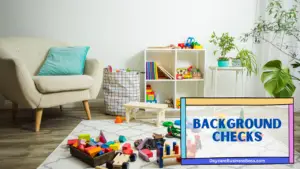Opening a daycare provides the promise of developing young minds, supporting growth, and having a good impact on families and communities. However, this undertaking is not without its difficulties. From assuring the children’s safety and well-being to complying with numerous requirements, the road to opening a daycare is methodically planned and thoughtfully performed.
To open a daycare, you typically need a suitable facility, licensing, background checks, qualified staff, safety measures, age-appropriate programs, and health/sanitation compliance. Regulations vary by location.
In this article, we will look at the key requirements that serve as the foundation of an effective daycare facility. Join us as we investigate the important aspects that pave the path for a meaningful daycare experience.
Suitable Facility
When it comes to daycare, the process of selecting the correct facility is really important. A critical consideration is ensuring that the chosen location has enough space to allow a variety of necessary activities such as play, educational pursuits, feeding, and rest. The arrangement of the facility is critical, requiring an environment that allows for easy supervision. This includes elements such as suitable lighting that promotes a secure ambiance, as well as effective ventilation for proper air circulation.
Childproofing measures are essential in the desire to establish a safe sanctuary for children. Safety gates positioned strategically around potentially hazardous places, as well as outlet covers to prevent accidents, are critical components. These safeguards are critical to preserving an atmosphere that protects children from potential danger and assures parents of their child’s well-being.
Licensing
Obtaining the required license is a critical and non-negotiable step in establishing a daycare center. It is the foundation of legitimacy and adherence to the established regulations. To begin this critical stage, you must contact your local regulatory agency, which can provide extensive insights into the requirements specific to your jurisdiction.
This complex procedure usually begins with the submission of a thorough application. This application provides a formal introduction to the intent of your daycare, detailing its scope, structure, and operating goals. The application that is submitted acts as the foundation for further evaluations.
Expect to undergo comprehensive inspections that analyze various aspects of your daycare’s set up as part of the licensing process. These inspections are intended to assure compliance with stringent health and safety regulations, as well as to confirm that the environment is conducive to children’s well-being. They also assess staff-to-child ratios, which are an important indicator of the quality of care and attention each kid receives.
To obtain the desired daycare license, strict adherence to particular standards about health, safety, and program quality is required. These criteria include things like good cleanliness, the provision of necessary safety measures, and a well-planned program that responds to the developmental needs of the children in your care.
Background Checks

Safeguarding the well-being of the children under your supervision necessitates a thorough dedication to their protection. One critical component of this dedication is the introduction of stringent background checks for all individuals involved in the childcare process, whether staff or volunteers. These checks, which include a variety of assessments, are an important defense mechanism for maintaining a safe and loving environment.
A key component of these inspections is criminal background checking. This technique assists in identifying any potential hazards that may jeopardize the protection of the children by delving into an individual’s criminal background. This approach not only assists in weeding out persons with questionable previous histories, but it also gives parents peace of mind in knowing that those engaging with their children are not possible threats.
Reference checks serve as a supplement, providing significant information about a person’s character, work ethic, and suitability for the childcare profession. Previous employers, coworkers, or acquaintances’ viewpoints can give light on a person’s interpersonal skills, accountability, and overall demeanor, allowing for a more comprehensive knowledge of their appropriateness.
Another important aspect is the verification of required qualifications. Confirming that staff members have the proper certificates and training guarantees that they have the knowledge and abilities to offer competent care. This step increases the daycare facility’s trustworthiness while also ensuring parents that their children are in capable hands.
Read more about: Beginners’ Guide to Daycare Entrepreneurship: What You Must Know
Qualified Staff
A thriving daycare is undeniably supported by qualified and dedicated staff members. The critical role they play in molding children’s experiences and supporting their growth emphasizes the need of selecting personnel with appropriate educational credentials and offering ongoing training to them.
Prioritize people with adequate educational qualifications in domains such as early childhood development, education, psychology, or similar areas when constructing a team. These certifications provide staff employees with a thorough understanding of child development concepts, allowing them to adjust interactions and activities to each child’s specific requirements. This ensures a comprehensive approach to cognitive, emotional, and social development.
However, education is only the first step. Maintaining a high-quality daycare facility requires regular training sessions. These sessions fulfill several functions. They keep employees up to date on the most recent insights and research in child development, ensuring that their practices are in line with current best practices. Safety standards and emergency procedures are of the utmost importance, and continual training ensures that staff members are prepared to manage any unanticipated emergencies while putting the children’s well-being first.
Training develops a sense of professional growth among staff members, allowing them to fine-tune their talents and approach. It promotes a culture of continual improvement, which benefits both the children and the caregivers.
Safety Measures
It is necessary to prioritize the safety of the children in your care. To do this, a complete structure of severe safety protocols encompassing a variety of safeguards is required, assuring the highest protection for every child.
A fundamental part is emergency preparedness. Emergency evacuation strategies should be carefully designed and practiced. Routine fire drills imitate real-life events and prepare both staff and students to respond quickly and efficiently in the event of a disaster. This proactive technique dramatically improves your daycare facility’s safety quotient.
Another key step is to provide your facilities with the necessary safety equipment. Smoke detectors strategically installed throughout the premises serve as early warning systems, alerting everyone to the possibility of a fire. In the event of a small fire, strategically placed and easily accessible fire extinguishers serve as rapid countermeasures. Child-friendly locks help to create a safe environment by limiting unwanted access and reducing potential risks.
The importance of receiving first aid training cannot be emphasized. Having staff members who are well-versed in first aid practices enables them to deal with minor injuries quickly and effectively. This training not only covers physical well-being but also emphasizes the facility’s dedication to providing a safe environment.
Regular safety checks are a proactive approach that pays off. These assessments, whether carried out by an internal team or by external experts, thoroughly examine the surroundings for any potential threats. From frayed cords to sharp corners, these examinations highlight problem spots and allow for immediate correction.
Age-Appropriate Programs

Creating age-appropriate programs in your daycare setting is a critical component of encouraging holistic growth and development in the children in your care. Recognizing that different age groups have different requirements and stages of development, your attempts to customize programs to these variations are critical.
Children’s development includes physical, emotional, and cognitive dimensions, each with its own set of stimuli. Focus on motor skill development for the youngest participants through gentle activities, tummy time, and sensory play. Simple interactions, such as peek-a-boo and gentle touch, help infants develop emotional attachment and cognitive engagement.
As they enter the toddler stage, their world becomes more open to inquiry and curiosity. Art projects that inspire creativity, controlled play that introduces kids to basic ideas, and group activities that build social contact are examples of age-appropriate activities. Storytime and music sessions can pique their interest while also promoting language development.
A more organized yet flexible curriculum is used for preschoolers. Educational activities based on fundamental ideas such as colors, shapes, and letters should be included. Creative expression in the form of art, drama, and role-playing not only develops cognitive talents but also improves emotional intelligence.
Your programs should support a smooth transition into formal education by the time children reach the pre-kindergarten stage. Activities that encourage reading, numeracy, problem-solving, and critical thinking should be included. Structured learning centers and theme units allow them to delve deeply into topics, cultivating a love of learning.
It is critical to strike a balance between structure and flexibility. While sticking to a schedule provides a sense of comfort, allowing for spontaneity and individual discovery that fits different learning styles and interests. This method respects each child’s rate of development.
Taking into account the particular needs of each child within their age group gives complexity to your approach. Some children may require extra attention or changes to fully engage in activities, whilst others may excel and require more difficult assignments to avoid stagnation.
Read more about: Kiddie Connections: Daycare Marketing Programs for Building Bonds
Health and Sanitation Compliance
Maintaining a clean and sanitary atmosphere within your daycare facility is critical to the general well-being and safety of the children in your care. In this context, strict health and sanitation rules form the foundation of your dedication to creating a safe and caring environment.
Proper food handling is an important aspect of cleanliness. Strict processes for meal preparation, storage, and serving guarantee that children are not exposed to potentially harmful foodborne infections. Regular handwashing, surface disinfection, and adherence to acceptable cooking temperatures reduce the risk of contamination and protect the health of all parties involved.
A well-organized cleaning routine is essential. Germs are kept at bay through careful cleaning of all locations, from playrooms to bathrooms. This not only protects the children’s health but also instills in them a feeling of order and responsibility in their surroundings. Because of their proclivity to harbor germs, high-touch surfaces such as doorknobs, light switches, and toys should be given special attention.
Disease-preventive methods should be smoothly integrated into your daily operations. This includes implementing vaccination mandates for children as well as regulations encouraging parents to keep sick children at home to prevent sickness spread. Clear lines of contact with parents about illnesses within the institution provide a collaborative approach to health management.
Proper storage is essential for upholding sanitary requirements. Keeping diapers, personal things, and cleaning materials separate helps to reduce cross-contamination. To eliminate odor and reduce the possibility of germ multiplication, diapers should be stored in sealed containers away from food areas and cleaned regularly.
It is critical to maintain a sanitary atmosphere that includes the children’s possessions. Encourage parents to carefully mark personal belongings to keep each child’s items separate and clean. Laundry linens, blankets, and soft toys regularly contribute to a clean and comfortable environment.
Frequently Asked Questions

What are the necessary credentials for daycare workers?
Daycare workers should be qualified in early childhood education, child development, or a similar profession to offer a safe and caring atmosphere. Background checks are essential, including criminal history and reference verification. Training on child development, safety standards, and emergency procedures should be provided regularly.
How do I handle daycare requirements that differ depending on location?
Daycare establishment regulations vary greatly depending on the area. Investigate your state’s or country’s restrictions, zoning laws, and municipal ordinances. To ensure compliance, contact local regulatory agencies for specific licensing requirements, facility standards, staff-to-child ratios, and health and safety recommendations.
What are the most important aspects of a daycare’s physical environment?
The physical atmosphere of a daycare must be safe and beneficial to child development. Make sure there is adequate childproofing, lighting, and ventilation. Install fire alarms, extinguishers, and first-aid kits as needed. Create age-appropriate play and learning places, as well as hygiene facilities and outdoor areas. Regular cleaning and maintenance are required to keep the atmosphere clean and sanitary.
To learn more on how to start your own daycare checkout my startup documents here.
The information provided by DaycareBusinessBoss.com (“The Site”) is for general informational purposes only. All information on the Site is provided in good faith, however, we make no representation or warranty of any kind, express or implied, regarding the accuracy, adequacy, validity, reliability, availability or completeness of any information on the Site. Under no circumstance shall we have any liability to you for any loss or damage of any kind incurred as a result of the use of the Site or Reliance on any information provided on the Site. Your use of the Site and your reliance on any information on the Site is solely at your own risk.
This blog post is for educational purposes only and does not constitute legal advice. Please consult a legal expert to address your specific needs. Terms and Conditions. (https://daycarebusinessboss.com/terms-conditions/)

Meet Shawn Chun: Entrepreneur and Childcare Business Fan.
I’m a happy individual who happens to be an entrepreneur. I have owned several types of businesses in my life from a coffee shop to an import and export business to an online review business plus a few more and now I create online daycare business resources for those interested in starting new ventures. It’s demanding work but I love it. I do it for those passionate about their business and their goals. That’s why when I meet a childcare business owner, I see myself. I know how hard the struggle is to retain clients, find good employees and keep the business growing all while trying to stay competitive.
That’s why I created Daycare Business Boss: I want to help childcare business owners like you build a thriving business that brings you endless joy and supports your ideal lifestyle.


